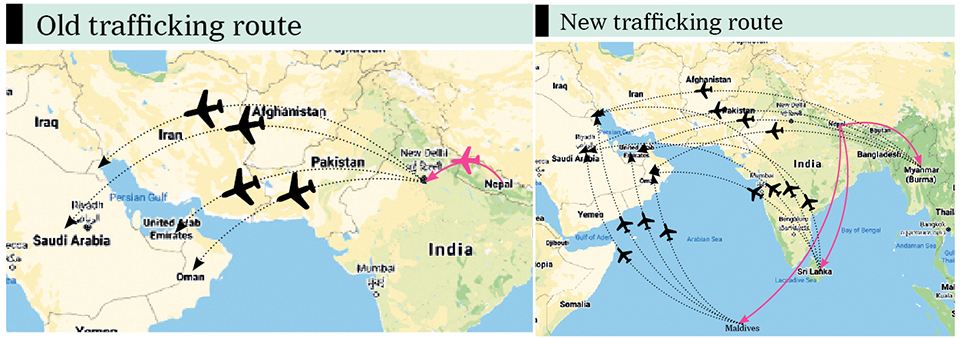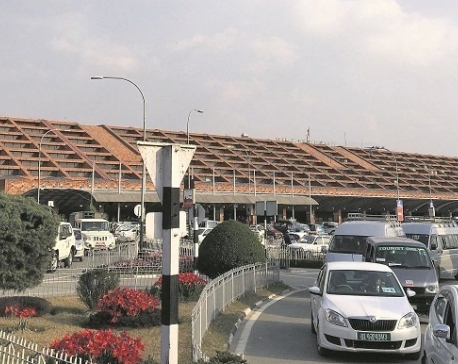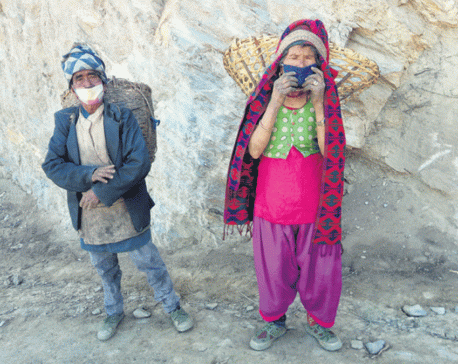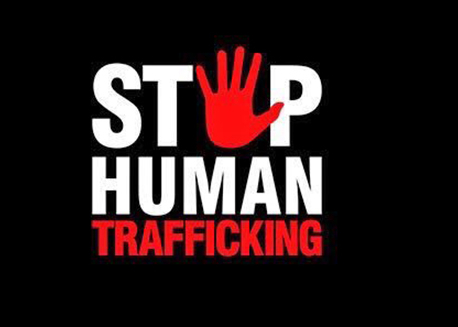
OR
Despite ban, Nepali women heading for Gulf and exploitation
Published On: March 2, 2020 08:02 AM NPT By: RUDRA KHADKA

KATHMANDU, Mar 2: Rashmi (name changed) was forced to work 16 hours a day in Saudi Arabia. She was sexually assaulted by her employers. She contacted the Nepali Embassy many times, asking the officials to rescue her. But the help never came.
After a year-long struggle, she finally escaped and returned home with the support from her family and relatives. But she did not get her payment.
She could not even claim compensation from the manpower agent, who had sent her to Saudi Arabia with the promise of a well-paid job and a comfortable work environment. She did not have official documents to sue the agent: “If I had legally gone to Saudi Arabia, I would not have faced trouble. I would have received my due salary well before my departure.”
She had to go to Saudi Arabia illegally because of Nepal government’s ban on the migration of Nepali housemaids to the Gulf countries and Malaysia. Rashmi did not have the skills required for other overseas jobs. She also did not have the academic qualification and financial resources to go to other safer labor destinations. She had somehow managed Rs 70,000 to finance her illegal migration to Saudi Arabia via New Delhi.
Rashmi’s illegal migration and its consequences demonstrate how the government’s decision to shut down labor destinations for thousands of Nepali housemaids without offering viable alternatives has backfired. Nepali housemaids are suffering from physical, mental and financial exploitation in the Gulf countries and Malaysia. The blanket ban has forced Nepali women to take an indirect and dangerous route to Saudi Arabia, Qatar, Kuwait, Oman, Bahrain, the United Arab Emirates and Malaysia. As a result, they have become vulnerable to threats, abuse and exploitation by their employers, labor recruiters and agents.
Kumari (name changed) was struggling to make a living in Nepal, so she went to Kuwait as a housemaid with the help of someone she knew. She crossed over to India from Bhairahawa, and then flew to Kuwait from New Delhi. After her Kuwaiti employer sought sexual favors from her, she ran away. But she was caught and put behind bars for four days. She is now back to Nepal, and says: “If I had gone there only after securing a labor permit, my employer would not have done that to me.”
After the government stopped issuing labor permits to Nepali housemaids, immigration authorities would turn them back from the Tribhuvan International Airport in Kathmandu. But Nepali housemaids were still going to the forbidden countries via New Delhi crossing into India, overland. To make the ban more effective, the Nepal government asked the Indian government to make it mandatory for Nepali women to produce a No Objection Certificate (NOC), issued by the Nepali Embassy in New Delhi, to pass through the immigration desks at the Indian airports. That move was meant to protect Nepali housemaids, but it is now forcing them to embark on an even more unsafe and uncertain journey to the prohibited labor destinations. Since the NOC was made mandatory, Nepali housemaids are going to the Gulf and Malaysia via Sri Lanka, Myanmar and the Maldives.
Some Nepali housemaids never reach their destinations. They are arrested and returned to Nepal in what police call ‘an act of rescue’. In 2019, between March and November, a total of 276 Nepali migrant workers were arrested from several parts of India. They were also forced to return to Nepal. Of them, 206 were women wanting to work as housemaids in the Gulf. Only 66 were male migrant workers. According to Nepal Police SP Govinda Thapaliya, 179 were arrested and returned from the north-eastern Indian state of Manipur. They were all trying to cross into Myanmar, from where they could fly to any Gulf country.
The latest ban on Nepali housemaids’ migration was imposed by the Ministry of Labor, Employment and Social Welfare in March 2016 on the instruction of the parliamentary committee on international relations and labor, which said Nepali women working abroad as domestic help are living and working under unsafe conditions. The committee has instructed the government to sign bilateral agreements with destination countries regarding housemaids before revoking the ban. But no significant diplomatic efforts have been undertaken by the government to sign such pacts.
Gender discrimination
Many view the government ban on the migration of Nepali housemaids as an act of gender-based discrimination. They argue that the ban is unconstitutional because Article 38 of the Constitution clearly states that people — either male or female — cannot be discriminated against on the basis of their gender.
Sudip Pathak, a member of the National Human Rights Commission, says that the government has no right to strip Nepali women of their right to work, and that such a discriminatory ban is not justifiable under any circumstances. He says: “The Constitution has clearly stated that men or women cannot be discriminated against based on their gender. The State has to follow the spirit of the Constitution.” He says that if the government thinks that Nepali women are working in unsafe conditions overseas, they must be given skills and knowledge about legal remedies.
Advocate Som Luintel also argues that the ban is discriminatory because not just the Constitution but also the Foreign Employment Act has provisions about equality between male and female workers. Before the ban, the government issued labor permits to Nepali women above the age of 24. Rights activists say the age bar for Nepali women migrant workers is also discriminatory because the Foreign Employment Act says anyone above the age of 18 are eligible to obtain labor permit.
Pabitra Rai of Panchthar complains that she was not allowed to go to work as a caregiver in Israel because she was not ‘old enough’. The 23-year-old nursing student says: “To set an age bar for women willing to work abroad is like not believing in their capacity”.
Manpower agents making a killing
After it became mandatory for the Gulf and Malaysia-bound Nepali women to produce the NOC at Indian international airports, they are being trafficked via Myanmar, Sri Lanka and the Maldives. These are even longer and dangerous migration routes. Many women who embark on this difficult journey never reach their destinations. They get stranded on the way. Some manage to sneak into the forbidden countries, but then they are abandoned by their agents. If they contact Nepali officials for help, they are ignored.
SP Thapaliya admits that trafficking in Nepali women, mostly for domestic help, continues unabated. They are first taken to India and then to Myanmar overland, or to Sri Lanka and the Maldives by sea, according to him.
Such women know that they chose to migrate illegally, so they shy away from soliciting legal aid even if they face abuse and exploitation on their way or at the labor destinations. Even if they are forced to return home, they cannot lodge complaints against their agents due to lack of proof. Manpower agents lure poor and desperate women with promises of good salary and comfortable work environment, but they will not have to pay anything even if the women trafficked by them are caught and sent back.
According to Thapaliya, only 24 of the 272 women rescued in the last 10 months have lodged complaints against their agents. He says: “Most women do not have proof. Even if they do, they hesitate to seek justice. They even refuse to come into contact with us.”
Police officials investigating human trafficking say the agents get anything from US$300 to US$500 per woman from employers for trafficking in women to Malaysia and Gulf countries. They also take hefty amounts from the women. If anyone has benefitted from the ban on migration of Nepali housemaids, they are the traffickers.
More exploitation
A research conducted by the National Human Rights Commission (NHRC) has found that the ban has failed to stop Nepali women from going abroad to work as housemaids. An NHRC report on the situation of the rights of migrant workers published in July 2019, says: “...due to restriction on mobility, the women faced discrimination, there were shortcomings in pre-departure orientation, and that women workers were vulnerable to physical abuse, sexual exploitation, as well as forced labor and unequal wage.”
In its 56th annual report in 2019, the Office of the Auditor General has pointed out a 14% increase in labor migration of Nepali women. The report is also critical of the government for failing to adopt a strategy to protect Nepali migrant workers.
In 2018, Felipe González Morales, a UN Special Rapporteur on human rights of migrant workers, had presented a report at the UN Human Rights Council. In the report, Morales says that Nepali housemaids have become more vulnerable to abuse and exploitation, especially after their mobility was restricted. Instead of safeguarding the rights of housemaids, they have been banned from migrating, which is discriminatory, says the report.
According to the DoFE, a majority of Nepali women have obtained labor permits to work in the UAE (59,126), which is followed by Kuwait (42,600), Malaysia (30,065), Lebanon (11,542) and Saudi Arabia (8,321). But these labor permits are not for domestic work. The number of Nepali women employed as domestic help in the Gulf is believed to be much higher. Some organizations working in the migration sector say the number of Nepali housemaids in Saudi Arabia alone could be over 100,000.
The DoFE officials estimate that about 200,000 Nepali women who obtained passports in the last decade have gone to the US or European countries. They also admit that most women have illegally migrated to work as housemaids in the Gulf countries. Hari Prasad Gyawali, director at the DoFE, says: “Around 400,000 Nepali women have migrated legally, and that figure includes those who are in the US, Europe and Australia.”
The way forward
The labor committee of the parliament has debated the ban on the migration of Nepali women as housemaids. But the members of parliament (MPs), who are on this committee, are divided over whether to revoke the ban. MP Bimal Prasad Srivastav, president of the labor committee, says that they are not sure about how to justify the withdrawal of the ban. A writ petition has been filed at the Supreme Court, claiming that the ban is in violation of the constitutional provisions. But the apex court has yet to hear the petition. Activists say the court needs to show urgency in hearing cases like this.
Back with babies
Rajani (name changed) from Jhapa had a sexual relationship with a Nepali man while working in Dubai. When she was pregnant with his baby, he went out of contact. She could not track him down. She already had two children before going to Dubai. She gave birth to the third one, and could not work in Dubai any longer.
Rajani had also gone to Dubai illegally. She says: “I wanted to earn money for my children back home. But I gave birth to a new baby, so I could not work.”
She divorced her husband because she returned home with a new child. She is now working as a laborer at construction sites in Jhapa. She says: “I never imagined foreign employment would have such consequences in my life.”
Two years ago, Sapana (name changed) from Dhading had gone to Saudi Arabia as a housemaid. She was forced to have sexual relationship with her employer. When she became pregnant, she was given a ticket to go home. Last year, she gave birth to a daughter. She is now worried about raising her baby.
Paurakhi Nepal’s coordinator Krishna Gurung says: “These women cannot tell their children who their fathers are. As single mothers, they find it difficult to raise their children.” According to her, only a few such women have been able to get compensation from the men who impregnated them.
This story was reported with support from the Media Foundation.
You May Like This

Repatriation of migrant workers’ dead bodies from Gulf starts, 23 bodies brought on the first day
KATHMANDU, June 19: The process of bringing back Nepali migrant workers’ dead bodies from abroad has started from Friday. A... Read More...

Jumla villagers show exemplary unity against COVID-19
JUMLA, April 4: Seven people who had gone to Dhipu village of Tila Rural Municipality – 9 to buy fodder... Read More...

12 Nepali women rescued from Kenyan dance bar repatriated
KATHMANDU, July 19: Twelve Nepali women, who were rescued from Kenya dance bar two months ago, were repatriated on Thursday. ... Read More...





Just In
- Ties with Tehran
- CM Kandel requests Finance Minister Pun to put Karnali province in priority in upcoming budget
- Australia reduces TR visa age limit and duration as it implements stricter regulations for foreign students
- Govt aims to surpass Rs 10 trillion GDP mark in next five years
- Govt appoints 77 Liaison Officers for mountain climbing management for spring season
- EC decides to permit public vehicles to operate freely on day of by-election
- Fugitive arrested after 26 years
- Indian Potash Ltd secures contract to bring 30,000 tons of urea within 107 days













Leave A Comment